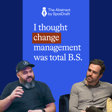
Ep 57: Bridging the gap between Politicians & Corps. with Jules Polonetsky, CEO, Future of Privacy
Join Jules Polonetsky, CEO and Founder of the Future of Privacy Forum, as he shares lessons he learned from the front lines of ad tech starting in the early 1990s. Starting his career in politics as a New York assemblyman and working his way into consumer protection-focused public roles, he became one of the first chief privacy officers in the tech industry at companies like DoubleClick and AOL at a crucial moment in the history of online privacy. Now his think tank connects policymakers with corporations, and helps both sides answer tough questions about privacy and data.
Join Jules Polonetsky, CEO and Founder of the Future of Privacy Forum, as he shares lessons he learned from the front lines of ad tech starting in the early 1990s. Starting his career in politics as a New York assemblyman and working his way into consumer protection-focused public roles, he became one of the first chief privacy officers in the tech industry at companies like DoubleClick and AOL at a crucial moment in the history of online privacy. Now his think tank connects policymakers with corporations and helps both sides answer tough questions about privacy and data.
Listen as Jules discusses his uniquely-positioned understanding of privacy issues, the future of AI governance and the chief privacy officer role, advice to lawyers who want to move into the privacy space, and much more.
Read detailed summary: https://www.spotdraft.com/podcast/episode-57
Topics:
Introduction: 0:00
Getting a start in New York politics: 1:57
Running for elected office: 11:46
Taking one of the first Chief Privacy Officer roles in the industry at DoubleClick: 16:43
Considering the necessary training to be successful in privacy: 24:28
Founding the Future of Privacy Forum: 32:02
Questioning the death of the Chief Privacy Officer role: 44:42
Favorite part of your day-to-day work and professional pet peeves: 51:54
Book recommendations: 56:41
What you wish you’d known as a young lawyer: 1:00:01
Connect with us:
Jules Polonetsky: https://www.linkedin.com/in/julespolonetsky/
Tyler Finn: https://www.linkedin.com/in/tylerhfinn
SpotDraft: https://www.linkedin.com/company/spotdraft
SpotDraft is a leading contract lifecycle management platform that solves your end-to-end contract management issues.
Visit https://www.spotdraft.com to learn more.



















